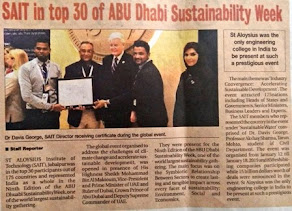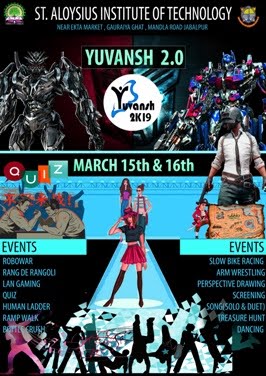Dr. Fr. Davis George
It has been rightly said by Mazinni “A person may die, but
the truth implanted by him can never die.” History bears a testimony to
the indisputable powers of non violence and truth. There have been many
people who have endured great suffering and pain and emerged victorious in
life. Lives of great people would bear testimony to the courage of
conviction and willingness to pay the price for the same. Such people
live on in the minds and hearts of people. Their example motivates and
inspires others to take the road less traveled. And yet stories of
hatred, violence, despair and destruction loom large in the news
headlines. Confronted with problems, pain, unjust suffering and
challenging situations, farmers, students, couples and others often take the
short cut of ending their lives. Suicide, murder, violence seem to take
the upper hand. Some people think that might is right and muscle
power can settle scores. Endurance and perseverance often take a back
seat.
It is in this context we must reflect on the crucifixion and
death of Christ on Good Friday. A man who went around doing good, who
made the lame walk, the lepers clean, the deaf hear and the dump speak was
accused and condemned due to vested interests, by religious leaders of his time
who could not face the light of truth as propounded by Jesus of Nazareth.
Those who believed in religious fundamentalism, who never practiced what they
preached, who only practiced piety to get appreciation and approval those who
ignored the cries of the poor, fabricated cases against the innocent Messiah
and felt victories in his physical death. This very act paved the way for
eternal life; Jesus destroyed death by dying on the cross and confirmed eternal
life for humanity by rising from the dead on the third day.
Christ’s death on the cross signified the victory of love
over hatred and cruelty. The Roman soldiers had spears and swords and
their hatred towards him would culminate in his death on the cross. But their
hatred and cruelty received only one response – forgiveness. All through
Jesus’s life there have been two great approaches to life, one against the
other. On the one side was hatred and on the other was love. They
beat him with a whip until his back was an open wound. They drove nails
through his hands and suspended him upon a cross. All day long the battle
raged. Hate surrounded him on all sides. But love upheld
him. When the battle was over, hate lay beaten in the dust.
Christ’s non-violence represents the impotence of hatred when confronted
by the power of love.
The cross is also a symbol of faith’s victory over cynicism
and despair. Many of us, unfortunately, seldom recognize this hidden
conflict. We have given up searching for the meaning of life or
contemplating over its apparent absurdities. We are too busy with the mundane.
Fortunately, for the most part, life treats us reasonably well on the
surface. But this is not true of all people. Many have more
than their share of tragedy. The pain and injustice that they see on
every side cause them to lose all faith in God and in life. If ever there
was a person who had the right to doubt God, and to despair of the human race,
and to become cynical about life, that person was Jesus. But listen to
him as he prays for his persecutors, “Father forgive them, they know not what
they are doing.” Listen to him as he tells a dying thief that they will
be together in paradise. Listen to him as he says, “Father, into your
hands I commit my spirit.” Through all the injustice and pain, his faith
in goodness and justice did not fail. He kept on believing in God, he
kept on believing in people, believing in life. At Calvary, Faith won a
resounding victory over cynicism and despair.
Finally, the Cross represents the victory of non-victory
over force. Jesus looked so weak on that cross that day. He had no
sword and no spear, and not even one soldier on his side. All his kith
and kin were onlookers from afar. The only thing he could do was to pray to
seek forgiveness for his enemies and then die. The world had never
witnessed a more pitiful display of willful helplessness than that.
Though he could, he did not call a battalion of angels to come to his
defense. He simply died. For some time it simply seemed that
violence was the victor. But two thousand years later, we commemorate not
the military might, but a man who died on the cross. That apparent defeat
at Calvary has turned out to be the greatest victory of all time.
It has given Jesus an unparalleled place in history.
Without striking a blow, he has conquered more hearts and changed more minds
and inspired more deeds than Caesar’s soldiers ever dreamed.
Mahatma Gandhi applied the power of non violence to
political situation on a mass scale against the strongest colonial power and
then established that non violence is the weapon of the strong and not the
weak. He often spoke of soul force and brute force. Gandhi said,
“An eye for an eye will make both blind.” Though non violence and
truth, Mahatmas Gandhi could bring political freedom tour country and at the
same time he dreamed for a greater freedom of the spirit.” The non
violent suffering of our countrymen reminded us that the Cross really is a
symbol of victory. It is not strange that on Good Friday we celebrate
faith rather than doubt. Two thousand years have passed that only
non-violence can combat and defeat brute force. Do we dare to believe
it? But what is more important, do we dare to try it?
This entry was posted in Good Friday Message
Subscribe to:
Post Comments (Atom)









0 comments:
Post a Comment